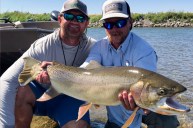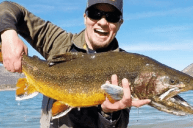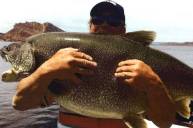Utah's 32-year-old lake trout record finally falls.
It is safe to say that 2020 has been one of the craziest years anyone can remember. While we have had to make many unfortunate sacrifices in the face of the coronavirus pandemic, one positive is more people outside enjoying the great outdoors.
We have also seen many fishing state records fall this year due to more people being out on the water. In one of the more notable records stories we have seen this year, Utah's 32-year-old lake trout record has just been broken.
The Utah DWR shared photos on their social media accounts of a massive, 53-pound, 15-ounce fish recently captured by Chance Scott in Flaming Gorge Reservoir in the northeast part of the state near the Wyoming border.
Flaming Gorge has long been known as a trout hotspot for not only lake trout, but browns and rainbows too. The 42,000-acre reservoir is home to the state records for all those species. There were not a ton of details on Scott's catch other than it measured 44.1 inches long and had a massive 34.7-inch girth. Scott decided to keep his catch, so no chance of it growing larger.
Scott's does not simply edge out the old record, it annihilates it. The old record was a 51-pound, 8-ounce fish caught by Curt Bilbey back in 1988. That huge catch also came from Flaming Gorge, helping further cement the reservoir's reputation as a lunker factory.
This year has been the year for lake trout records. Back in March, New Hampshire's lake trout record, which had stood for over 37 years, also fell. Like the Scott fish, that lunker left no doubt which catch was larger. The New Hampshire catch beat the old record by almost nine pounds. Idaho saw their state record for a catch-and-release rainbow trout fall a little over a month ago. Congratulations to Scott on his great catch. Keep it here at Wide Open Spaces for all the latest news on state and world record catches.
For more outdoor content from Travis Smola, be sure to follow him on Twitter and check out his Geocaching and Outdoors with Travis YouTube channels.
NEXT: THE AXIS DEER AND HOW THEY'RE IMPACTING PARTS OF THE UNITED STATES
WATCH





